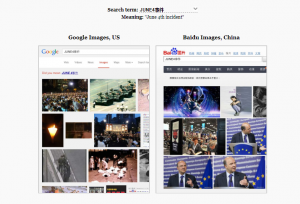Difference between revisions of "Censorship in China"
| Line 11: | Line 11: | ||
===Google vs Baidu=== | ===Google vs Baidu=== | ||
Baidu is the largest search engine in China with over 2 billion users.<ref>https://en.wikipedia.org/wiki/Baidu</ref> However, because of its censorship, the affordances of Google and Baidu are vastly different. This has led many to crack the firewall for access to tools such as Gmail and Google Scholar. With Google hoping to reenter mainland China, the search results may look more similar to that of Baidu but affords China's users the access to Google resources.<ref>https://qz.com/216829/see-what-china-sees-when-it-searches-for-tiananmen-and-other-loaded-terms/</ref> | Baidu is the largest search engine in China with over 2 billion users.<ref>https://en.wikipedia.org/wiki/Baidu</ref> However, because of its censorship, the affordances of Google and Baidu are vastly different. This has led many to crack the firewall for access to tools such as Gmail and Google Scholar. With Google hoping to reenter mainland China, the search results may look more similar to that of Baidu but affords China's users the access to Google resources.<ref>https://qz.com/216829/see-what-china-sees-when-it-searches-for-tiananmen-and-other-loaded-terms/</ref> | ||
| − | ===Getting Past the Firewall | + | ===Getting Past the Firewall=== |
| − | + | Internet users have found ways over the years to circumvent the censors. Ultrasurf, Psiphon, and Freegate are popular software programs that allow Chinese users to set up proxy servers to avoid controls. While VPNs are also popular, the government crackdown on the systems have led users to devise other methods, including the insertion of new IP addresses into host files, Tor—a free software program for anonymity—or SSH tunnels, which route all internet traffic through a remote server. <ref>https://www.cfr.org/backgrounder/media-censorship-china</ref> | |
===Traditional Media=== | ===Traditional Media=== | ||
===Banned Words/Concepts=== | ===Banned Words/Concepts=== | ||
| − | |||
==Ethics== | ==Ethics== | ||
==References== | ==References== | ||
Revision as of 20:12, 15 March 2019
Censorship is the suppression or prohibition of any parts of books, films, news, etc. that are considered obscene, politically unacceptable, or a threat to security.[1] Censorship in China has been practiced throughout its history including the burning of Confucian texts by Emperor Qin in the third century BCE and the control of media during the Cultural Revolution. With the rise of the internet, China has an army of bots and millions of human censors working around the clock to police daily activities.[2] This effort is commonly known around the world as the Great Firewall.
Contents
The Great Firewall
Purpose
Methods for internet censorship include bandwidth throttling, keyword filtering, and blocking access to certain websites. These websites include but are not limited to Facebook, Twitter, Google, and Wikipedia.[3] It is not known exactly how the Firewall filters through posts, videos, comments, and other forms of user generated content. Some never appear while others appear but are removed, while others appear and stay. Research done in 2014 showed that China allows for the criticisms of the state, its leaders, and their policies, whereas posts with collective action potential are much more likely to be censored. Censorship in China is used to muzzle those outside government who attempt to spur the creation of crowds for any reason—in opposition to, in support of, or unrelated to the government. The government allows the Chinese people to say whatever they like about the state, its leaders, or their policies, because talk about any subject unconnected to collective action is not censored. The value that Chinese leaders find in allowing and then measuring criticism by hundreds of millions of Chinese people creates actionable information for them and, as a result, also for academic scholars and public policy analysts.[4]
Google had set up shop in mainland China in 2006, offering a version of its services that conformed to the government’s oppressive censorship policies. At the time, Google officials said they’d decided that the most ethical option was to offer some services—albeit restricted by China’s censors—to the enormous Chinese market, rather than leave millions of Internet users with limited access to information. However, in 2010, Google shut down its search engine and all operations within mainland China after a cyber attack where it found that the Gmail accounts of a number of Chinese human-rights activists had been hacked. It moved all operations to Hong Kong, China where all forms of traditional and nontraditional media was uncensored at the time.[5] In 2018, Google revealed its plans to launch a censored version of its search engine within China again named the "Dragonfly Project". Many employees protested, naming the "urgent moral and ethical issues" involved in the move.[6]
Google vs Baidu
Baidu is the largest search engine in China with over 2 billion users.[7] However, because of its censorship, the affordances of Google and Baidu are vastly different. This has led many to crack the firewall for access to tools such as Gmail and Google Scholar. With Google hoping to reenter mainland China, the search results may look more similar to that of Baidu but affords China's users the access to Google resources.[8]
Getting Past the Firewall
Internet users have found ways over the years to circumvent the censors. Ultrasurf, Psiphon, and Freegate are popular software programs that allow Chinese users to set up proxy servers to avoid controls. While VPNs are also popular, the government crackdown on the systems have led users to devise other methods, including the insertion of new IP addresses into host files, Tor—a free software program for anonymity—or SSH tunnels, which route all internet traffic through a remote server. [9]
Traditional Media
Banned Words/Concepts
Ethics
References
- ↑ https://en.oxforddictionaries.com/definition/censorship
- ↑ https://www.cnn.com/2013/10/07/world/asia/china-internet-monitors/index.html
- ↑ https://www.cfr.org/backgrounder/media-censorship-china
- ↑ http://science.sciencemag.org/content/345/6199/1251722?casa_token=f8ofS6DrYqcAAAAA:vwldmGPv7KxV2DIX7Xt7NMKVhxYlZuCXOKzhfTjsEQ9xaCui3YRkUVhvA1EkkgGFc0LUVe0WaIEFLMA
- ↑ https://www.theatlantic.com/technology/archive/2016/01/why-google-quit-china-and-why-its-heading-back/424482/
- ↑ https://theintercept.com/2018/08/16/google-china-crisis-staff-dragonfly/
- ↑ https://en.wikipedia.org/wiki/Baidu
- ↑ https://qz.com/216829/see-what-china-sees-when-it-searches-for-tiananmen-and-other-loaded-terms/
- ↑ https://www.cfr.org/backgrounder/media-censorship-china
